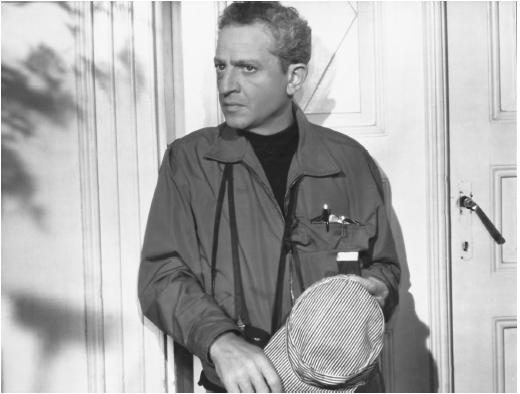
An Appreciation by Noah Mallin
These last few weeks have been something of a deathwatch at Planet of Sound with great masters going left and right. Now, just a week after one of his great leading men died, writer, actor and director Jules Dassin has gone.
That leading man was Richard Widmark, indelibly brilliant in Night and The City, Dassin's bleak London-set noir and the last film he would make before his blacklisted exile in Paris.
His first feature film, Nazi Agent in 1942 was an unusually fast-paced potboiler for staid MGM. Despite the silliness of it's twin switching Nazi tricking plot it's anti-fascist stance was consistent with the views Dassin would espouse for the rest of his life.
In 1947 he made the searing prison drama Brute Force starring Burt Lancaster. Though some of the themes are laid on a bit thick (this must be the most innocent group of prisoners ever) the harsh contrast between the unhinged prison administrators and the desperate prisoners is memorable, as are the stellar performances and Moody cinematography.
The Naked City, made the following year, was a groundbreaking police procedural and a classic of American cinema. Before the postwar period studio films were usually setbound, with a modicum of location shooting added for flavor. Dassin used real New York settings exclusively for Naked City, which effected a documentary like realism that revolutionized the industry. The city itself became a character with the intricate plot allowing a peek into the lives of New Yorkers of every stripe. The exciting climax on the Williamsburg Bridge is justifiably celebrated as a great moment in film.
The follow-up, Thieves Highway, was a gritty drama of gangsters and revenge, with a nasty Lee J. Cobb as a crooked trucker and Richard Conte as the man seeking revenge on him while getting pulled into the muck himself. Prefiguring in some ways the themes of both On The Waterfront and Francis Coppola's Godfather films, its stature has grown over the years.
His last pre-blacklist film, 1950's Night and The City, may also be his best. Richard Widmark gives a tricky morally ambiguous performance as small time hood Harry Fabian -- a man determined to wrest a bigger slice of the pie only to find himself as a main ingredient in it. The extreme bleakness of the film turned off mainstream audiences but stimulated filmmakers like Martin Scorsese who would apply some of that noir bite to 70s classics like Mean Streets and Taxi Driver. A tremendously influential and watchable film.
Dassin was named by fellow director Edward Dmytryk as having joined the Communist party in the 1930s during testimony in front of the House Un-American Activities Committee. Dassin could see that his career had been torpedoed and he faced the prospect of worse punishment by fleeing to France despite only speaking a smattering of the language.
France was beginning to experience a homegrown crop of directors like Godard that were influenced heavily by the noir staples turned out by Hollywood directors like Dassin, whom they considered to be autuers. Dassin would return to filmmaking before long, making his comeback with Rififi ( Du Rififi Chez les Hommes in its native title ) in 1955. A meaty heist film with a bravura nearly silent robbery as its centerpiece, it echoes many of the notes of hopelessness and dread that appeared in Night and The City. Again, the influence on future filmmakers like Scorsese, Sidney Lumet and Quentin Tarantino is unmistakable in its frank violence and fatalist themes.
He Who Must Die (1957) teamed him with his future wife Melina Mercouri and was cited by Dassin as his favorite of his own works. A complicated tale of power and morality set in Turkish occupied Crete, the story of an authority-defying priest who causes a town to take sides must have hit home for the exiled Dassin.
The audacious Never on Sunday was a massive international hit. Dassin cast himself as an enthusiast of Greek culture who travels there in hopes of pinpointing why the luster of the ancients seems to be lacking in its present-day citizens. Fetching Mercouri plays the no-nonsense prostitute that he fixates on as the object of his educational efforts. The Pygmalion inspired comedy was a tour-de-force for Mercouri.
Dassin and Mercouri
Dassin continued his lighter touch with a wryly subtle parody of his own Rififi in 1964. Topkapi had several touches that were tongue-in-cheek set-ups of the earlier film and starred Mercuri again (as was becoming customary) along with Peter Ustinov who would win an Oscar as one of the heisters.
Dassin and Mercori were exiled from his wife's country of Greece where they both served as thorns in the side of the fascist military junta. His 1974 film The Rehearsal dramatized the uprising of students against the military but the junta lost power at the same time as the film's release. They both returned to Greece for good.
Mercouri died in 1994 but her name lived on not just in film but in the foundation Dassin ran and which became a driving force for the return of Greek antiquities.
Clips:
The closing sequence for The Naked City:
Dassin and Mercouri in Never on Sunday:
You are being redirected - hold on tight!
Tuesday, April 1, 2008
Film: Filmmaker and Blacklist Survivor Jules Dassin Dies at 96
Posted by
Noah Mallin
at
3:31 PM
![]()
Labels: blacklist, film news, jules dassin, melina mercouri, movie news, Noah Mallin, obit
Subscribe to:
Post Comments (Atom)





No comments:
Post a Comment